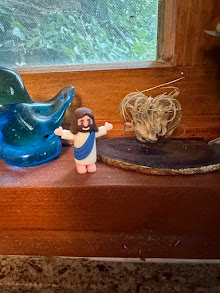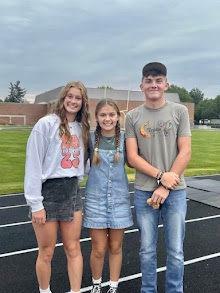
The farmers came to the college town first class, in a limo with lots of leg room and complimentary bottles of water. Winter still reigned in the foothills but a watery sun warmed the stone buildings and the tinkling of a fountain belied the chill in the morning air.
The streets were empty; no student to speak of. But evidence of a young energetic population was obvious: a coffee/sandwich shop on the lower level nestled cheek by jowl with a bar advertising happy hour. A running shoe clinic stood across the plaza; a "smoke shop" featured products other than tobacco. Taverns, a downtown book store, arts and crafts and various haggard dirty unshaven hangers on with backpacks or instrument cases defined the downtown as undeniably youthful, mid to upper class, adventurous, and curious, all those characteristics not usually associated with farmers.
The fourth floor office suite throbbed with creativity. A boulder that had necessitated a special exemption resided as spiritual center of the organization. Under a back lit dome, it implied strong ties to Mother Earth for the various food products arrayed on the glass shelves surrounding it. Whether a Kraft energy potion or "Annie's Honey Bunnies" ( no icky additives or pesky preservatives), the foods on the shelves were part and parcel of the creative portfolio of the brain trust on the fourth floor.
We dropped our bags in an office, no, more like a library of cookbooks and knicknacks. Floor to ceiling decals, even Velveeta! Wind chimes of silver spoons, wall art of wine and vine, two hanging planters of herbs, once live, now dried. I took a picture of the month's worth of activities and the raised fist with the (pitch)fork leading the way to the Food Revolution. We farmers know what we know about revolutions. We are heirs to the Green Revolution; we feel threatened by the Slow Food movement. Forgive me if I formed my own opinion of any program including the movies King Corn and Food, Inc. and projected the reception the Missouri corn farmers might get at a brunch get together.
Inklings hardened into suspicions when the breakfast spread included organic this and natural that, gluten free, additive free, pasteurized (good old Meadow Gold), and beautifully out of season berries, blue and red. The coffee was fresh and hot; we were supplied brown paper moleskin lookalikes with plain brown wrapper ink pens to take names and make notes. Chairs filled with the young, the thoughtful, the casual, the curious, the creative minds of the the agency.
The boss was distinguishable only by a few grey hairs. Despite the apparently one sided listing of presenters and programs, he reiterated the aim of a fair and balanced hearing of all sides of the food spectrum. Many of the folks working at the firm had experience with farms, farmers, and some type of agriculture; at lunch later on, he declared us paranoid when we said we felt the accumulated good will of generations of consumers for farmers had dried up just like the thyme in the hanging pot. And, as it turned out, the roomful of creative types did exhibit humor, empathy, and a healthy curiosity about what it meant to be a farmer, a corn farmer, a big farmer and a family farmer. They listened attentively to the notion that organic was not necessarily natural, that natural was not always safer, that modern methods of farming were kinder and gentler to the environment and that we big industrial strength farmers lived in little bitty places and worked hardest of all to protect our land because we loved it. Their questions were thoughtful and sensible even while they showed telltale signs of the fear of the scientific we farmers have grown to dread. Interestingly enough, these young movers and shakers were not terrified by the structure of agriculture, nor was there a single question regarding animal welfare, both subjects we farmers view with fear and loathing. No, the biggest bogeyman in the Tea Room was the unknown, misunderstood, stepchild of Monsanto, the GMO. Yep, that scary GMO and its insidious presence in just about everything was blamed for autism, obesity, asthma, and other dark and dreadful unknown future maladies. GMOs were unleashed upon an unsuspecting public with goodness only knows what terrifying results. Untested and hyper fertile, GMOs, in the mind of the folks at that meeting, would take over the gene pool of the world, rather like the zombies lurking just under the skin of normal appearing humans.
So, what did a roomful of creative advertising folks want to ask of a genuine farmer? What kind of farming? Did we use GMOs? How much time did he spend on the farm? What would he do differently in a perfect world? The farmer explained in detail the balance sheet of nitrogen and the facts of life of inputs and outputs. Why was he a farmer? What about our family? These are the types of questions we love to answer, the kind that allow us to emphasize the bonds of family and community as we demonstrate the generational memory so rare in this mobile and transient era. Yes, we farmers pride ourselves on our dual personalities: ying for early adoption of labor saving, technological and scientific advances, yang for tradition, family ties and loyalty, roots to community, church, school, even when it is not any obvious advantage to do so.
No doubt I have forgotten some vital observation from our day in the college town. But it was encouraging to meet with a group that was truly inquisitive, without hosting an inquisition. So often the sides in the food/agriculture/organic debate are calcified, chips on all shoulders just the tip of the iceberg of willful misunderstanding and disagreement. Are farmers overly defensive? Do we assume the worst in every well meaning inquiry? Are our actions open to misinterpretation while we pile up the factoids for trench warfare? Are we like the leaders of one agribusiness, polling anyone for a way to become loved, just like Sally Fields? Speaking as one farmer venturing into presupposed hostile territory, sometimes, yogurt or not, breakfast can be common ground.















No comments:
Post a Comment